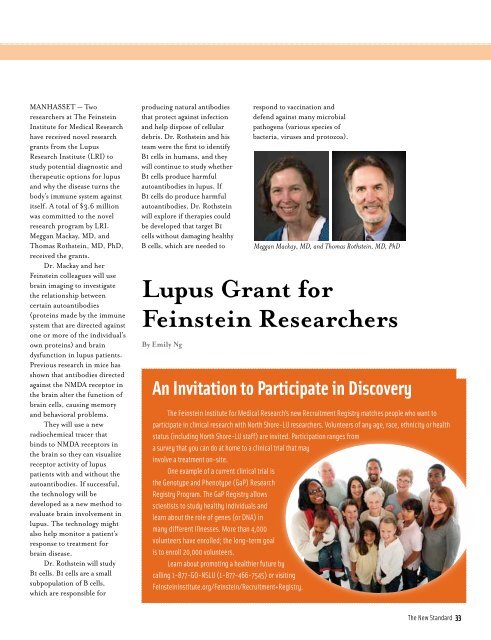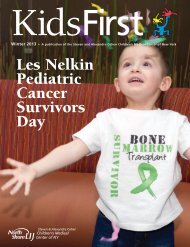Support for Soldiers and Veterans You Gotta Have Heart The Joy of ...
Support for Soldiers and Veterans You Gotta Have Heart The Joy of ...
Support for Soldiers and Veterans You Gotta Have Heart The Joy of ...
You also want an ePaper? Increase the reach of your titles
YUMPU automatically turns print PDFs into web optimized ePapers that Google loves.
MANHASSET — Two<br />
researchers at <strong>The</strong> Feinstein<br />
Institute <strong>for</strong> Medical Research<br />
have received novel research<br />
grants from the Lupus<br />
Research Institute (LRI) to<br />
study potential diagnostic <strong>and</strong><br />
therapeutic options <strong>for</strong> lupus<br />
<strong>and</strong> why the disease turns the<br />
body’s immune system against<br />
itself. A total <strong>of</strong> $3.6 million<br />
was committed to the novel<br />
research program by LRI.<br />
Meggan Mackay, MD, <strong>and</strong><br />
Thomas Rothstein, MD, PhD,<br />
received the grants.<br />
Dr. Mackay <strong>and</strong> her<br />
Feinstein colleagues will use<br />
brain imaging to investigate<br />
the relationship between<br />
certain autoantibodies<br />
(proteins made by the immune<br />
system that are directed against<br />
one or more <strong>of</strong> the individual’s<br />
own proteins) <strong>and</strong> brain<br />
dysfunction in lupus patients.<br />
Previous research in mice has<br />
shown that antibodies directed<br />
against the NMDA receptor in<br />
the brain alter the function <strong>of</strong><br />
brain cells, causing memory<br />
<strong>and</strong> behavioral problems.<br />
<strong>The</strong>y will use a new<br />
radiochemical tracer that<br />
binds to NMDA receptors in<br />
the brain so they can visualize<br />
receptor activity <strong>of</strong> lupus<br />
patients with <strong>and</strong> without the<br />
autoantibodies. If successful,<br />
the technology will be<br />
developed as a new method to<br />
evaluate brain involvement in<br />
lupus. <strong>The</strong> technology might<br />
also help monitor a patient’s<br />
response to treatment <strong>for</strong><br />
brain disease.<br />
Dr. Rothstein will study<br />
B1 cells. B1 cells are a small<br />
subpopulation <strong>of</strong> B cells,<br />
which are responsible <strong>for</strong><br />
producing natural antibodies<br />
that protect against infection<br />
<strong>and</strong> help dispose <strong>of</strong> cellular<br />
debris. Dr. Rothstein <strong>and</strong> his<br />
team were the first to identify<br />
B1 cells in humans, <strong>and</strong> they<br />
will continue to study whether<br />
B1 cells produce harmful<br />
autoantibodies in lupus. If<br />
B1 cells do produce harmful<br />
autoantibodies, Dr. Rothstein<br />
will explore if therapies could<br />
be developed that target B1<br />
cells without damaging healthy<br />
B cells, which are needed to<br />
respond to vaccination <strong>and</strong><br />
defend against many microbial<br />
pathogens (various species <strong>of</strong><br />
bacteria, viruses <strong>and</strong> protozoa).<br />
Meggan Mackay, MD, <strong>and</strong> Thomas Rothstein, MD, PhD<br />
Lupus Grant <strong>for</strong><br />
Feinstein Researchers<br />
By Emily Ng<br />
An Invitation to Participate in Discovery<br />
<strong>The</strong> Feinstein Institute <strong>for</strong> Medical Research’s new Recruitment Registry matches people who want to<br />
participate in clinical research with North Shore-LIJ researchers. Volunteers <strong>of</strong> any age, race, ethnicity or health<br />
status (including North Shore-LIJ staff) are invited. Participation ranges from<br />
a survey that you can do at home to a clinical trial that may<br />
involve a treatment on-site.<br />
One example <strong>of</strong> a current clinical trial is<br />
the Genotype <strong>and</strong> Phenotype (GaP) Research<br />
Registry Program. <strong>The</strong> GaP Registry allows<br />
scientists to study healthy individuals <strong>and</strong><br />
learn about the role <strong>of</strong> genes (or DNA) in<br />
many different illnesses. More than 4,000<br />
volunteers have enrolled; the long-term goal<br />
is to enroll 20,000 volunteers.<br />
Learn about promoting a healthier future by<br />
calling 1-877-GO-NSLIJ (1-877-466-7545) or visiting<br />
FeinsteinInstitute.org/Feinstein/Recruitment+Registry.<br />
<strong>The</strong> New St<strong>and</strong>ard 33




